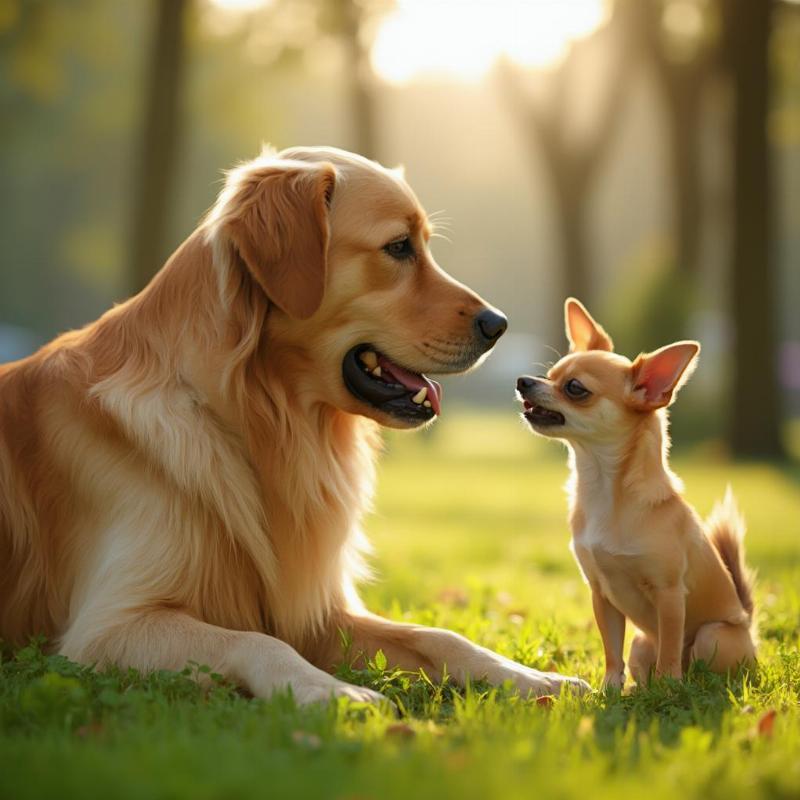Big dogs, little dogs, what’s the difference, really? When it comes to unconditional love and companionship, size truly doesn’t matter. While Dr. Seuss may not have specifically written a book titled “Dr. Seuss Big Dog Little Dog,” the underlying themes of acceptance and celebrating differences present in his works resonate deeply with the diverse world of canine companions. From the towering Great Dane to the petite Chihuahua, each dog brings unique charm and affection to our lives. This article explores the joys and challenges of owning dogs of different sizes, offering practical tips and heartfelt stories to celebrate the special bond between humans and their furry friends.
Big vs. Little: A Matter of Lifestyle and Love
Choosing a dog, regardless of size, is a big decision. It’s about finding a furry friend whose personality and needs mesh with your lifestyle. Big dogs, often stereotyped as boisterous and energetic, can surprise you with their gentle nature and love of cuddling. Conversely, small dogs, often perceived as delicate and lap-loving, can be surprisingly feisty and adventurous.
- Space Considerations: Big dogs need space to roam and play. A small apartment might not be the ideal environment for a Great Dane, but a Chihuahua could thrive there.
- Exercise Needs: While all dogs need exercise, the type and intensity vary. A long hike might be perfect for a Siberian Husky, but a brisk walk around the block could suffice for a Maltese.
- Training: Both big and small dogs benefit from training. Early socialization is key for all breeds, ensuring they grow into well-adjusted companions.
 Big and Little Dog Playing in the Park
Big and Little Dog Playing in the Park
Nutrition Needs: Tailoring Diets for Different Sizes
Just like humans, dogs of different sizes have different nutritional needs. A large breed puppy requires a different diet than a small breed adult. Consult your veterinarian to determine the best food for your dog’s age, breed, and activity level.
- Large Breed Puppies: Large breed puppy food helps control growth rate, preventing skeletal problems later in life.
- Small Breed Dogs: Small breed dog food often comes in smaller kibble sizes, making it easier for them to chew and digest.
- Senior Dogs: Senior dog food addresses the changing nutritional needs of older dogs, supporting joint health and cognitive function.
The Big and Small of It: Health Considerations
Size can also play a role in a dog’s susceptibility to certain health conditions. Large breeds are prone to hip dysplasia and bloat, while small breeds might be more susceptible to tracheal collapse or dental issues. Regular veterinary check-ups and preventative care are essential for all dogs, regardless of size.
- Regular Vet Visits: Annual check-ups help identify potential health problems early on.
- Dental Care: Brushing your dog’s teeth regularly can prevent dental disease, a common issue in small breeds.
- Weight Management: Maintaining a healthy weight is crucial for preventing joint problems and other health issues.
Finding Your Perfect Match: Big, Little, or Somewhere In Between
Whether you’re drawn to the gentle giant or the pocket-sized companion, the most important factor is finding a dog whose personality complements your own. Consider your lifestyle, living space, and activity level when choosing a dog.
“The bond between a human and a dog transcends size,” says Dr. Emily Carter, a renowned veterinarian specializing in canine behavior. “It’s about finding a companion whose energy and temperament match your own, creating a harmonious partnership.”
Conclusion: Celebrating the Love of All Dogs, Big and Small
From the towering Great Dane to the tiny Chihuahua, Dr. Seuss’ message of embracing differences resonates perfectly with the diverse world of dogs. Whether you’re a “big dog” person or a “little dog” person, the love and companionship these furry friends offer is immeasurable. By understanding the unique needs of dogs of different sizes, we can provide them with the best possible care and strengthen the incredible bond we share with them. Remember, choosing a dog is about choosing a family member, and the size of that family member truly doesn’t matter.
FAQs: Big Dog, Little Dog Edition
-
Are big dogs more expensive to own than little dogs? Generally, yes. Big dogs eat more food, require larger beds and crates, and often have higher veterinary bills.
-
Are small dogs better for apartment living? While small dogs are often well-suited to apartment living, their energy levels and barking tendencies can vary greatly.
-
Do big dogs need more exercise than little dogs? Typically, yes. Large breeds often require more vigorous exercise than small breeds.
-
Are small dogs easier to train than big dogs? Trainability depends more on breed and individual temperament than size.
-
Are big dogs more protective than little dogs? Both big and small dogs can be protective, but this trait also depends on breed and individual personality.
-
Do little dogs live longer than big dogs? On average, small dog breeds tend to have longer lifespans than larger breeds.
-
Is it safe to have big and small dogs together? Yes, with proper introductions and supervision. It’s crucial to ensure the larger dog understands how to interact gently with the smaller dog. “It’s about fostering mutual respect and creating a safe environment for all your furry companions,” adds Dr. Carter.
